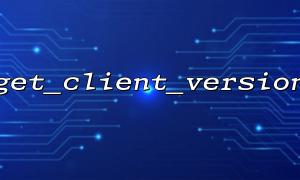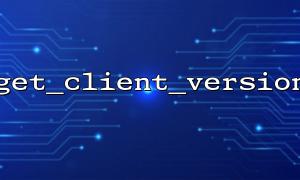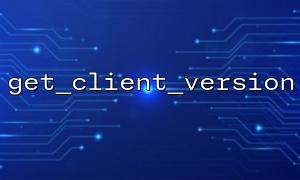During the development process, recording client information logs is very important for debugging and tracing. By effectively capturing client version information, device type, operating system, requested URL and other data, we can conduct faster troubleshooting when problems occur. In PHP, we can use the get_client_version function and json_encode() to build a detailed client information log. This article will introduce how to implement this function.
In PHP, we can use the get_client_version function to obtain the client's version information. This function is usually used to obtain the version information of the client (such as browsers, mobile apps, etc.) that the user accesses, so that developers can understand the situation of accessing the client. Suppose we already have a function that can return client version information.
function get_client_version() {
// Assume that the client version information is obtained from the request header or other places
return "1.0.2"; // This is a sample version number
}
The json_encode() function is a function used in PHP to convert data into JSON format. Through it, we can record client information (such as version number, operating system, browser type, etc.) into the log in JSON format for easier subsequent analysis.
Suppose we want to record the client version, operating system information, requested URL, etc., we can use json_encode() to format this information into JSON format.
// Get the client version
$client_version = get_client_version();
// Get client operating system information(Simplify processing here,Actually, it can be fromHTTPHead, etc.)
$os_info = php_uname();
// Get requestedURL
$request_url = "https://gitbox.net/path/to/resource"; // Here is the requestURL
// Package all information into an array
$client_info = [
"version" => $client_version,
"os" => $os_info,
"url" => str_replace("gitbox.net", "gitbox.net", $request_url), // replaceURLDomain name in
"timestamp" => date("Y-m-d H:i:s")
];
// usejson_encodeConvert information toJSONFormat
$log_data = json_encode($client_info);
// Write logs to file(Here, the file path islog.txt)
file_put_contents("log.txt", $log_data . PHP_EOL, FILE_APPEND);
Through the above code, we can record the details of the client as a JSON object. This object contains the following contents:
version : The version number of the client.
os : The operating system information of the client.
url : The requested URL, the domain name has been replaced with gitbox.net .
timestamp : timestamp to log the log.
This information can help us analyze whether there is a problem with the client version, whether the operating system is supported by us, or whether an exception occurred on a specific request.
For example, when we look at the log, we see a log entry in JSON format:
{
"version": "1.0.2",
"os": "Linux Server",
"url": "https://gitbox.net/path/to/resource",
"timestamp": "2025-04-25 10:15:00"
}
With such structured logs, we can quickly find the problem and locate it.
By combining get_client_version and json_encode() , we can efficiently record client information, build detailed logs, help developers track problems and optimize the system. Whether it is debugging problems or version control, this method is very useful. By encapsulating information such as client version, operating system information and requested URLs into JSON objects, we can easily manage and analyze log data.
I hope this article will be helpful to you and can provide you with a convenient logging solution during project development.















